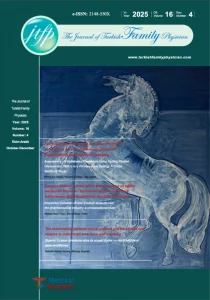Drinking and driving behaviors and associated risky behaviors in university students
Introduction and purpose: It has been reported that driving and non-compliance with the rules are common in young adulthood. Consequently, millions of people experience serious injuries secondary to traffic accidents and live with long-term negative health consequences. The aim of this study is to find an answer to the question of what are the alcoholic driving behavior and related socio-behavioral factors in university students.
Method: In the study, 2508 students selected by the stratified cluster sampling method among the students studying at the faculties and colleges in the central district of Çanakkale Onsekiz Mart University were collected with a 41-question questionnaire prepared by the researchers. The data related to traffic safety, substance use and some violent behaviors were selected for this article.
Results: Smoking in drunk drivers rate (32.7%), hookah smoking rate (61.7%), alcohol use rate (25.2%), substance use rate (2.8%), physical fight in the last year to those who do not have a mixing ratio (26.2%), a weapon carrying ratio (15.3%) was significantly higher than those who did not.
Discussion and conclusion: These findings suggest that showing risky behavior also triggers risky behaviors. Family Physicians also have a preventive health service role in matters such as traffic and security and should be developed.
References
- Özcebe H. Birinci basamakta adolesan sorunlarına yaklaşım. STED 2002;11(10):372–7.
- Evren H. Trakya Üniversitesi öğrencilerinin riskli sağlık davranışları ve sağlık hizmetleri kullanımları. Yüksek Lisans Tezi, Trakya Üniversitesi Sağlık Bilimleri Enstitüsü Halk Sağlığı Anabilim Dalı, 2008.
- Killianova T. Risky Behavior. In: Encyclopedia of Behavioral Medicine. (eds) Gellman MD, Turner JR. 1st edition. New York, Springer Science+Business Media, 2013:1692-3.
- Ögel K, Karadağ F, Cüneyt Evren P, Defne Tamar Gürol D. Bağımlılık profil indeksi uygulayıcı indeksi [Online]. http://www.bapi.info.tr/dosyalar/bapirehber.pdf adresinden 31.12.2020 tarihinde erişilmiştir.
- Doğan T. Üniversite öğrencilerinin iyilik halinin incelenmesi. Hacettepe Üniversitesi Eğitim Fakültesi Derg 2014;30(30):120–9.
- Özcebe H. Gençlerde riskli davranışlar ve sağlığın geliştirilmesi: Türkiye’de gençlerin sağlığına genel bir bakış. XI. Ulusal Halk Sağlığı Kongresi Kitabı. 2007: 149–53.
- Laude JR, Fillmore MT. Simulated driving performance under alcohol: effects on driver-risk versus driver-skill. Drug Alcohol Depend 2015; 154:271-7.
- Parker BS, Watson B, King MJ, Hyde MK. “I drove after drinking alcohol” and other risky driving behaviors reported by young novice drivers. Accident Analysis and Prevention 2014; 70: 65-73.
- Corte CM, Sommers MS. Alcohol and risky behaviors. Annu Rev Nurs Res 2005;23:327-60. PMID: 16350769.
- Bingham CR, Elliott MR, Shope JT. Social and behavioral characteristics of young adult drink/drivers adjusted for level of alcohol use. Alcohol Clin Exp Res 2007 Apr;31(4):655-4. doi: 10.1111/j.1530-0277.2007.00350.x. PMID: 17374045; PMCID: PMC1989671.
- Özkul SA, Kaya ÇA, Ünalan PC, Akman M, Çifçili S, Uzuner A. İstanbul’ da aile sağlığı merkezlerinde koruyucu adolesan sağlığı yaklaşımında kaçırılmış fırsatlar. Turkish Fam Physician 2015;6(1):18–29.



